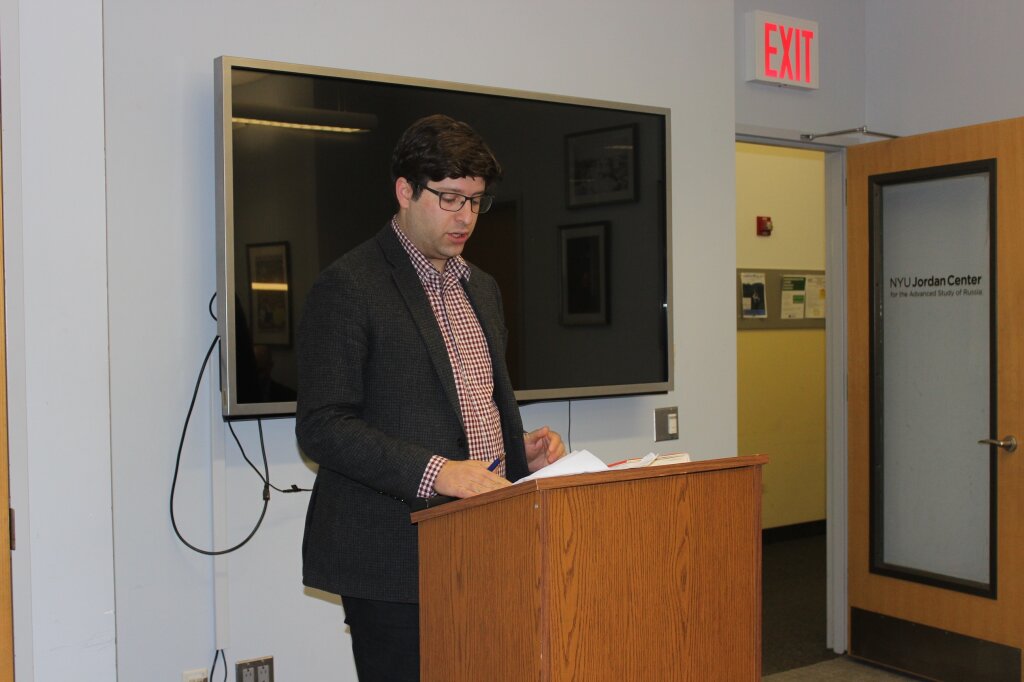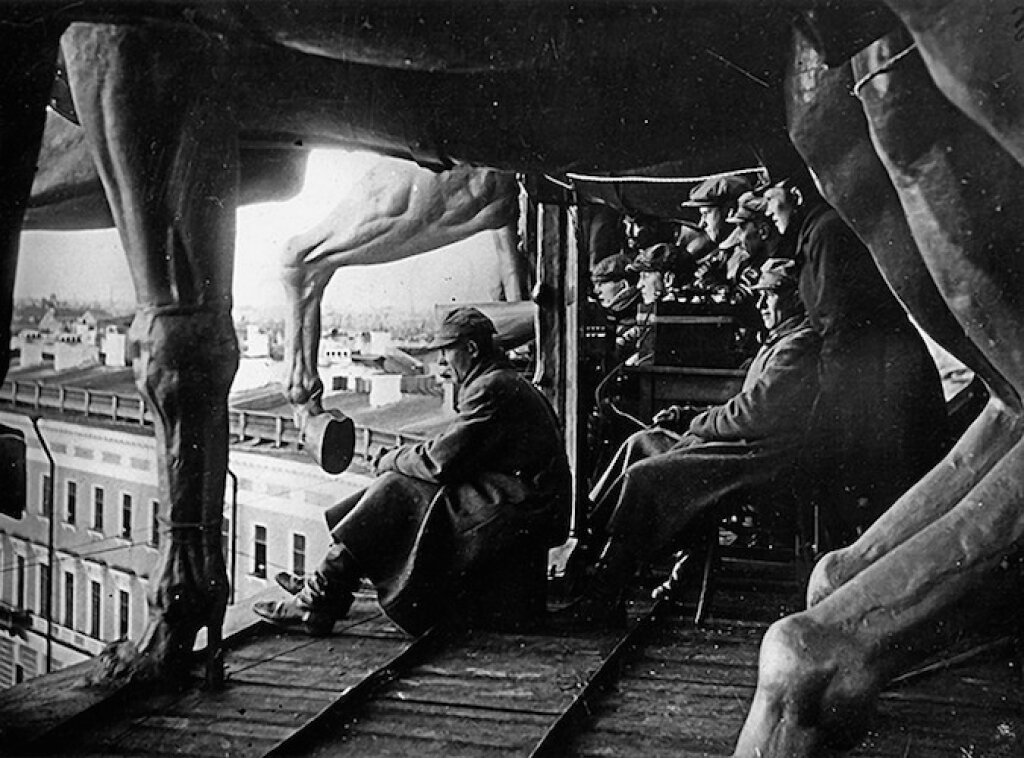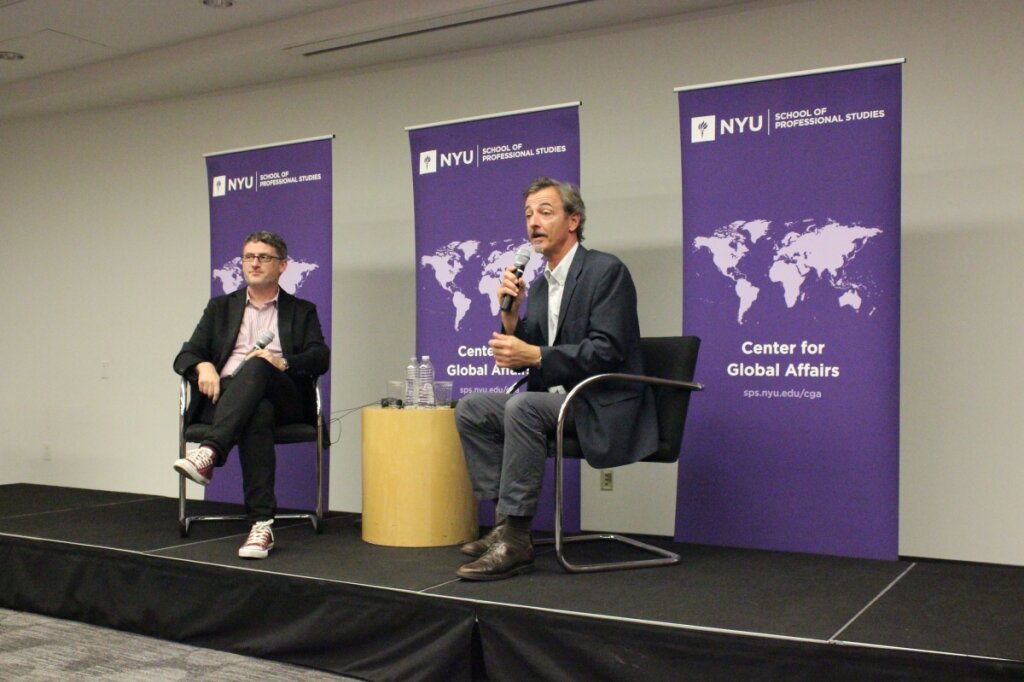Watch the event video here
In late 1999, as Vladimir Putin began his long rule over Russia, the new president faced a slew of economic and political problems, but also an existential one. While post-Soviet countries like Belarus and Estonia had apparently settled into new national narratives (continuity with the past for Belarus, rupture and independence for Estonia and the other Baltic states), Russia remained weak, unmoored, and divided.
Putin feared that a “creaking, traumatized” Russia was in danger of slipping from the ranks of top tier global powers, said Shaun Walker during a talk at the Jordan Center for the Advanced Study of Russia on January 23. Walker gave an overview of his new book, The Long Hangover - Putin’s Russia and the Ghosts of the Past, which examines the Kremlin’s use of Russian and Soviet history to reinforce Putin’s regime.
Putin’s answer to Russia’s ills was a project of “restorative nostalgia” rooted in the country’s last uncontested victory—the defeat of Nazi Germany in World War II, which Russians often call the Great Patriotic War. By uniting around the war as the inspiring, foundational myth of their new country, Russians could shore up their global clout and prestige. Everything else, including economic recovery, would follow.
“Putin turns to the one event that has the kind of narrative potential to unite the county and serve as a kind of foundation stone, and that’s the victory in the Second World War,” Walker said. “Views on 1917 and 1991 are very differing, but views on 1945 are not. They transcend political allegiance, generation, economic status.”
Putin’s government began sponsoring marches and other ceremonies commemorating the war. Though Yeltsin had reintroduced Victory Day parades in 1996, the one held after Putin’s 2000 inauguration was the largest since the Soviet collapse. In 2005, 60,000 Kremlin-sponsored youths marched through Moscow and accepted bullets from WWII veterans, a symbolic passing of the torch to a new generation. That same year, the state news service RIA Novosti distributed orange-and-black St. George’s ribbons, which became the ubiquitous iconography of subsequent Victory Days. A few years later, heavy weaponry returned to parades, reminiscent of Brezhnev-era demonstrations of military might on Moscow’s Red Square.
The reason for the symbolic power of the Soviet victory in WWII, Walker said, is that to this day most Russian families have personal stories of sacrifice and survival from the war years. Soviet losses against Hitler’s Germany were immense, victory won at the cost of many millions of military and civilian deaths. While political ideologies in contemporary Russia are often “a means to an end,” Walker said, the war occupies a special, reverential position in Russian political life.
The war also represented victory for a nation that felt beaten down and exploited, which Putin made explicit in his remarks to WWII veterans in 2005. Walker quoted Putin, saying, “through you, we got used to being winners. This entered our blood. It was not just responsible for military victories. But this will also help our generation in peaceful times, to help us to build a strong and flourishing country.”
Walker’s book features a diverse cast of characters, some of whom demonstrate to what extent Russia’s cult of the Second World War has penetrated perhaps unlikely quarters. Walker profiles Ivan Panikarov, a resident of Russia’s far eastern Kolyma region, which was an epicenter of Stalin’s regime of forced labor. After the Soviet collapse, Panikarov gathered items from the region’s Gulag days and displayed them in his apartment as a makeshift, informal museum. Nonetheless, Walker found Panikarov sympathetic to Stalinist policies.
“Of course, the Gulag was cruel, of course bad things happened,” Walker recalled Panikarov saying. “But we mined 500 tons of gold during the war in Kolyma, and if we hadn’t mined that gold, who knows if we would have won the war?”
Walker drove with Panikarov to a site where Stalin’s security services had executed prisoners, only to find that it had been covered with flags commemorating the 70th anniversary of the May 1945 victory.
“With this one little move, it seemed to me the whole meaning of this monument had been changed,” Walker said. “These people were no longer people who were shot for imaginary crimes, but they were martyrs in this bigger cause.”
The war’s central importance has intensified to the point that it has become taboo to question the official narrative, Walker said. As an example, he described a 2015 Victory Day ceremony in Grozny, Chechnya, in which locals reenacted the storming of the German Reichstag and laid Nazi flags before Ramzan Kadyrov, Chechnya’s strongman leader. At no point was any mention made of the fact that, as Soviet forces stormed the Reichstag in 1945, Stalin’s NKVD was deporting the entire Chechen nation to Central Asia.
Audience members asked Walker questions about Russia’s upcoming presidential election, the means by which the Kremlin spreads and reinforces its war narrative, and the extent to which Victory Day celebrations carry undertones of Great Russian nationalism.
On the last point, Walker noted how flexible the war narrative can be. While Putin and other officials sometimes do underscore the ethnic Russian role in World War II, they also emphasize the multinational character of the war effort—particularly when trying to appeal to a common history with Ukraine or Belarus. Likewise, though the Allies rarely appear in official discourse of the war, they are remembered when the Kremlin seeks to engage western partners in a transnational project, such as counterterrorism.



